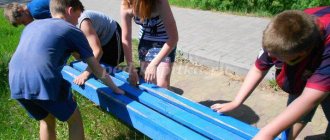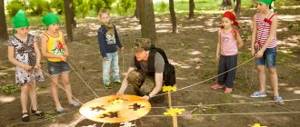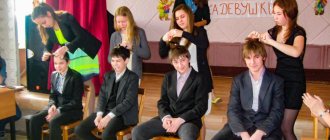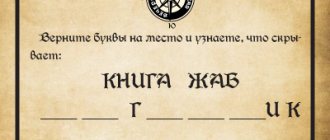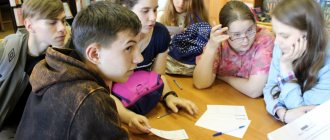MAGAZINE Preschooler.RF
Quest game “Travel around your hometown”Tulyusina Elena Valentinovna teacher of MKDOU kindergarten No. 53 “Swallow” City of Kovrov, Vladimir region
Using quest gaming technology when getting acquainted with your hometown.
In modern society in recent years there has been a tendency towards a decrease in the importance of many universal human values, including such a high feeling as love for the Motherland, therefore the problem of patriotic education of the younger generation is the most pressing today.
It is necessary to cultivate patriotism from early childhood, not forgetting that patriotism in each child is formed individually. It is connected with the spiritual world of man. The task of teachers is to make these experiences vivid and unforgettable. The content of education should be aimed at raising a cultured person who loves his city, region, and his homeland. Academician D.S. Likhachev wrote: “The feeling of love for the Motherland must be carefully cultivated, instilling spiritual settledness, since without roots in one’s native area, a person looks like a withered plant, a tumbleweed .
A preschooler, first of all, must recognize himself as a member of the family, then a citizen of Russia, and only then an inhabitant of planet Earth. You need to go from near to far.
A quest in pedagogy is the completion of a problem task with game elements. The implementation of preschool education programs consists of organizing forms of cognitive and research activities specific to preschoolers, creative activity through play. Educational activities to familiarize preschoolers with their hometown in the quest format fit perfectly into the concept set by the Federal State Educational Standard for Education.
I conducted the quest game “Travel around my hometown” It was necessary to “conduct” a tour for a foreign guest. The journey took place according to a jointly created map-scheme from one educational space to another. The ultimate goal was to find a hidden surprise, which could be reached by consistently completing tasks. A completed task is the key to the next point and the next task. The children, together with the guest, “visited” various significant sites of the city and demonstrated their knowledge. All types of children's activities were used. The journey was unusual, memorable, exciting, fun, and playful.
Routing
Quest game “Travel around your hometown”
Group: pre-school group (6-7 years old).
The general game goal is a tour for a foreign guest around the city of Kovrov, getting to know the city’s objects, their purpose, preparing a souvenir and refreshments for the guest.
Program content:
- To instill in children a sense of patriotism, pride and affection for their hometown.
- Contribute to the rapprochement and organization of the group, foster a culture of behavior.
- To develop in children the ability to work in a team, understanding that the overall result depends on the efforts of everyone.
- To form social and communicative competencies of children: friendliness, ability to negotiate, unite to solve a common problem.
- To consolidate children's knowledge about the buildings of their hometown and their purpose.
- Strengthen children's ability to navigate in space.
Participants: foreign guest, tour guide, city residents.
The effectiveness of teaching activities when using the quest game was demonstrated for children in the following areas:
- We got acquainted with the cultural appearance of our hometown.
- Have an idea of the cultural and geographical uniqueness of their hometown
- Able to think freely and fantasize
- Moral qualities have been formed: love for one’s hometown, respect for working people.
- The sustainability of children's play associations has strengthened.
- Improved speech communication of children in play activities
- We learned to fairly and politely evaluate the actions of ourselves and our comrades.
- They know how to follow the rules and norms of behavior in a joint game.
Literature
- Bykhovsky Ya.S. What is an educational quest? //
- Order of the Ministry of Education and Science of the Russian Federation (Ministry of Education and Science of Russia) dated October 17, 2013 No. 1155 Moscow “On approval of the federal state educational standard for preschool education .
- Sokol I.M. Quest: method or technology? // Computer at school and in the family. – 2014. – No. 2 (114). – P. 28
| Next > |
Inside-out quests: who, how and why comes up with urban entertainment
Photo courtesy
One of the most popular entertainments today is city quests. In the warmer months, many Muscovites increasingly prefer active activities - especially if it involves demonstrating resourcefulness and logic. Representatives of companies involved in the development of quests told m24.ru what the other side of these games looks like.
– How do ideas for quests come about?
Questery: Each quest is based on a theme that can captivate and interest a specific audience. For tourists, these are the central areas of the city and attractions. For lovers of unusual routes, we select locations related to films, television series, and books. For lovers of leisurely walks in nature, quests in parks are suitable. In cities with an abundance of modern art objects, quests are being developed, for example, on graffiti.
Street Adventure: It's actually simple: you walk around the city, at some point you take a wrong turn and end up in a new place. You look around and think: “Wow, how cool it is here! You can write a quest." Although, of course, we follow trends, what is interesting to people now, and come up with something new. For example, when clients ask: “Do you have a quest over there and about this?” several times, we understand what needs to be done. The season also matters: in the summer we look more closely at parks and streets, in the winter we switch to museums and car quests.
Photo courtesy of Questionery
– How long does it take to prepare one quest?
Questery: If the screenwriter has already decided on the theme and semantic outline, preparation takes on average two days. During this period, a route of 25 questions with answer options, tips and additional information is developed. It is necessary to prepare not only the text part of the route, but also the graphic one - select photographs for some questions, and also build the relationship of the route points with each other in a convenient logistical and semantic sequence.
QuestPlanet: The time for creating a quest excursion is individual and usually takes from several weeks to a month.
– Tell us about the stages of developing one quest. What do you pay special attention to?
Questery: Development can be divided into three stages. The first is creating a concept for a future quest, searching for locations, connecting all the points into one logical and exciting route. At this moment, the content part is developed: questions, tips, answers and additional information. The second stage is completing the route on the ground. Here we see what the quest actually looks like: how complex and exciting it is, whether the points are conveniently located and at what distance from each other, whether additional information is correctly selected, whether something should be added or removed. The third stage is making adjustments and testing with a focus group.
Street Adventure: It all starts with forming an idea: what this quest will be about and where, will there be a plot or just a walk with an emphasis on history, what will be the length of the route, writing a draft of questions. Then the screenwriter goes for a walk and examines all the objects, nooks and crannies, and essentially acts as a kind of scanner - he records everything that comes along the way and analyzes whether it can be included in the quest. When the approximate route and questions have already been drawn up, the editing stage begins - the text is transformed into fiction, hints are generated, and the quest is entered into the game system. After that, we check it in action. We pay special attention to everything at once, but it is especially important that the questions are interesting, clear and clearly formulated.
Photo courtesy of QuestPlanet
“Walkers of the Adventure”: We choose an interesting territory, from our point of view, lay out a route that is optimal in terms of travel time (based on two hours), mark stopping points where there will be questions and objects about which our stories will be. Then “fish” is written – a quest without information content. The screenwriter works with the “fish”: he comes up with the outline of the adventure game, the legend. At this moment, the route is adjusted, clarified, some questions go away, others appear. In the finale, the author of the adventure game writes texts related to interesting objects of the route and selects illustrations.
QuestPlanet: The process begins with collecting information and approving an approximate route or a specific location that should form the basis of a quest excursion. After collecting information, a team of compilers goes to the site and plots the ideal route from a logistics point of view. This process can take a long time and involve several visits. After this stage of work is completed, all received information is processed and brought into compliance with uniform quality requirements. Next, the quest is transferred to our system and switched to testing mode.
Photo courtesy
– Who tests your quests? Do you often have to finalize something before it goes live?
Questery: Our friends, acquaintances and focus groups take the routes first. The focus group consists of volunteers. At this stage, anyone can sign up to become a Questery tester. To do this, just leave your email on our website or write to us on social networks. Sometimes the route turns out almost perfect right away, but there are also times when you have to redo a good half. As a rule, after the test, up to 20% of the quest is finalized.
Street Adventure: We usually test it ourselves; if it’s about another city, we can ask someone to take the quest and check it. In fact, when other people pass, a more objective assessment is obtained. We look at which questions are written correctly, which ones are unclear to people, which ones are difficult to find, and how much time the participants spent. Hints, answers and questions usually have to be refined to make sure that each participant can complete the route.
Photo courtesy
“Adventure Walkers”: We ourselves and our friends test our adventure games. Of course, all our participants are also testers - the scenarios are not unchanged, because museum exhibitions, as well as city streets, are constantly changing. Accordingly, we have to make adjustments, change questions or descriptions.
QuestPlanet: All quests at the initial stage go through already established test groups, usually 5-10 teams. After the quest is launched and ready for work, the testing frequency is 1-2 months.
– What would you consider to be difficult tasks when preparing a quest? How do you overcome them?
Questery: Beautiful quests can easily be built remotely, and when playing on the ground there is always room for amendments - one is closed for repairs, the other has been completely dismantled. Objects are constantly moving, graffiti is erased and redrawn in completely different places. Therefore, we have to improvise and look for an equivalent replacement and no less interesting objects.
Photo courtesy of Questionery
Street Adventure: The hardest thing is to predict what will remain the same in the city and what will not. For example, we will create a question about some attraction, and then find out that it is closed for reconstruction. Then we suddenly run and change the route/question, although most often the clients are the first to know about the changes. And we treat criticism as loyally as possible.
“Walkers Adventure”: The most difficult thing is to create the ideal route, such that it is as eventful as possible and at the same time does not tire you. The idea of a question does not always come instantly: sometimes it is necessary for the information collected in sources and photographs taken, the feeling of a place obtained as a result of walking along a new route, as they say, to “cook” in the author’s head for some time.
– How to make the quest so that it is not very difficult, so that it can be solved, and not very simple? How to maintain this balance?
Questery: There is always a temptation to increase the difficulty of tasks and questions. But then we remember our main goal - getting to know the city in a playful way. This is not a competition or a terrain navigation test. This is leisure time, which has a time frame. We want a person to enjoy walking around the city, and not wander for hours looking for an answer to encrypted mysterious messages. We also have a special parameter for screenwriters: “imagine that you are a Chinese tourist,” so that there are no specific tasks associated with a purely Russian perception.
Photo courtesy of QuestPlanet
Street Adventure: It’s much easier to create quests with different levels of difficulty, because some people just want to take a walk, while others want to seriously puzzle over the riddles. Hints always come to the rescue: we create them so that absolutely everyone can come to the correct answer. In general, we do not write questions that require specific deep knowledge to answer. That is, it is unlikely that in our quest you will encounter the need to know the year of birth of the son of such and such an architect or how the piston system of a car works.
– Why, in your opinion, do many people consider city quests a more effective way to get to know the city than guided tours?
Questery: Completing a city quest first of all very much concentrates the player’s attention on the objects around him. Even psychologically, information received in the format of riddles or quests is absorbed better than retold in the usual form, as during a standard excursion. Try to remember at least one excursion you were on in detail? Sooner or later you begin to get lost in your thoughts, you want to yawn, sit down somewhere, or even take a break and go have a snack...
Photo courtesy of QuestPlanet
Street Adventure: Of course, because of the greater involvement in the process. In the quest, all information is presented in a condensed form, which also makes the situation easier.
“Walkers Adventure”: In the quest, participants get the opportunity to interact with the city. Difficulties allow you to study urban objects more carefully, and overcoming them allows you to remember the information.
QuestPlanet: I think there is no need to contrast the format of classic excursions with quest excursions. These are completely different products, each of them has its own audience. Currently, there is a decline in interest among young people in classical excursions. And quest excursions are an excellent alternative, accessible and understandable to many. With their help, it is possible to focus the attention of participants on interesting details with the help of questions, and in addition provide them with an excursion component.

